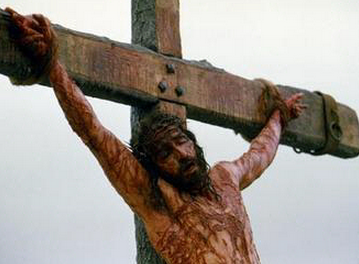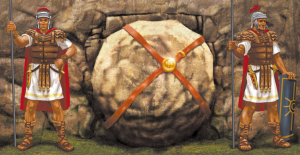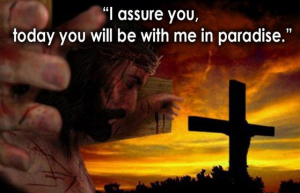The Apostles’ Creed leaps from the birth of Jesus to His suffering and death. It isn’t that His years of ministry are unimportant. Rather, in the sacrifice of Christ we discover God’s love most clearly. Jesus had already made clear that no greater love can ny man show than to lay down his life for his friend (John 15:13). But in Jesus’ case, His life was given for His enemies as well. This is what love looks like.
The Cross of Christ also shows us the horrid face of sin, because in order to banish it from the world, the Holy One had to die.
He Suffered
The last moments leading up to Jesus’ death are summed up in two words.
He suffered!
Jesus endured the full measure of human agony. The specific suffering mentioned here is not the pain of crucifixion and death. This is the suffering that followed his capture and arrest. Jesus was beaten, mocked, whipped, spat upon, stripped naked, falsely accused, falsely judged, and crowned with thorns. He was then betrayed, abandoned, and denied by His closet friends.
The suffering of the Messiah was prophesied from the very beginning (Genesis 3:15). Isaiah foretold of the Savior’s wounding for our transgressions, His oppression and affliction on our behalf and His lamb like journey to the slaughter (Isaiah 53:3-10).
Christ allowed these injustices to pull Him into suffering for two reasons. One, as a remedy for sin. Two, as an example for behavior, in cultivating obedience, patience, and courage. Thomas Aquinas
Pontius Pilate
 By naming Pontius Pilate, who was Roman procurator of Judea from 26-36 A.D., the Creed identifies for us both the time and the place of Christ’s death. Pilate is not named in order to shame him forever, but to give the passion of Christ a historical anchor. The Christian faith is deeply embedded in human history.
By naming Pontius Pilate, who was Roman procurator of Judea from 26-36 A.D., the Creed identifies for us both the time and the place of Christ’s death. Pilate is not named in order to shame him forever, but to give the passion of Christ a historical anchor. The Christian faith is deeply embedded in human history.
The Jews were under Roman domination as the time of Christ, and the law prevented them from handing down a death sentence. The Jewish leaders who wanted Jesus dead were forced to bring their prisoner before Pilate to get the verdict they wanted. Jesus was dragged before the Roman procurator on trumped up charges of blasphemy and sedition.
Pilate found NO FAULT in Him and told the Jews so (John 18:38). Yet, Pilate did not release Him. Succumbing instead to political pressures and the clamour of Jesus’ enemies, Pilate eventually gave both the order to scourge Him (John 9:1) and to have Him crucified (John 19:16). For that, Pontius Pilate’s name lives in infamy.
Crucifixion
Innocent though He was, Jesus was sentenced to execution. Pilate allowed Him to be sent to the Cross.
In the days of Jesus, crucifixion was a distinctly Roman form of torture, an exceedingly cruel death. Death was certain, but it came with an excruciating, almost idle, slowness. Christ endured unspeakable pain for several agonizing hours. People we were walking by probably looked up at the Cross and thought they were seeing a thief getting what he deserved. Little did they know that He was our greatest benefactor, getting what WE deserved.
More awful even than the pain that wracked His body was the suffering in Jesus’ soul. The Father turned His back on His son, and left Him to die alone and forsaken. That moment of abandonment was the deepest abyss of Christ’s suffering, when He cried out “My God, why have You forsaken Me?” (Matthew 27:46). The high priest had already offered the answer to His question earlier. He said that it was expedient that one man should die for the people, so that the people would not perish (John 18:14).
Death
 Jesus was executed. He drew His last breath in agony. His heart stopped beating, and He gave up His spirit with a loud cry. Jesus died.
Jesus was executed. He drew His last breath in agony. His heart stopped beating, and He gave up His spirit with a loud cry. Jesus died.
The punishment for sin is as old as the world itself. It was the verdict brought down on Adam and Eve for their disobedience ~ if you sin, you die (Genesis 2:17). Paul repeated this in the New Testament. “The wages of sin is death” (Romans 6:23). In other words, it costs something to sin. The price is high indeed. Jesus’ death demonstrates that it also costs something to forgive.
He Chose To Die
In all this, Jesus did not simply get killed. No man took His life from Him. He laid it down of His own accord (John 10:18). Willingness did not necessarily come easy for the Son of God. He prayed for His Father to take the bitter cup away. After great anguish of heart, and in the face of crushing fear, He chose death. He could have backed out at any moment. Taunts for Jesus to call down the angels could have been silenced the the appearance of the heavenly host (Matthew 26:53) But He stayed on the Cross. He could have escaped, but He chose not to.
Payment for Sin
Atonement. After the Fall nd sin, we were hopelessly separated from God. Jesus was our second chance. Christ’s atoning death extends as far as the curse of Adam is found.
It covers every sin completely, fully, and finally.
His brutal death was something He tasted for every man (Hebrews 2:9). His death was a ransom paid on behalf of us all (1 Timothy 2:6). “God was in Christ reconciling the world to Himself” (2 Corinthians 5:19).
What happened to Jesus ought to have happened to us. He endured divine wrath. He caught the deadly bullet upon which our names were written. He took our place. The Lord did not escape death. He endured it. He conquered it. He transformed it. He made it a door to life. By dying, He paid the price for sin, and mercy for sinners is now possible. It is available to anyone who will repent and believe.
Buried
 Near the end of the day, two men rushed to Pilate, begging permission to take Jesus’ body. Joseph of Arimathea, along with Nicodemus, wished to give their beloved teacher a proper burial. After the day’s humiliation and horror, it was the least they could do. Joseph offered his own tomb, and Nicodemus supplied a hundred pounds of fragrant spices. Anointing and binding Jesus’ body with linen strips was the final farewell of disciples who were heartsick and confused. The rock was rolled into place and the mourners turned away towards their homes as the sun began to set.
Near the end of the day, two men rushed to Pilate, begging permission to take Jesus’ body. Joseph of Arimathea, along with Nicodemus, wished to give their beloved teacher a proper burial. After the day’s humiliation and horror, it was the least they could do. Joseph offered his own tomb, and Nicodemus supplied a hundred pounds of fragrant spices. Anointing and binding Jesus’ body with linen strips was the final farewell of disciples who were heartsick and confused. The rock was rolled into place and the mourners turned away towards their homes as the sun began to set.
Descended Into Hell
Jesus became sin for us enduring the just punishment for sin.
We have Christ’s own words on the condemnation of hell (Matthew 23:33). He warned that many would be cast into unquenchable fires there (Mark 9:43). Jesus also said, “I will show you whom you should fear: fear Him who after He has killed, has power to case into hell; yes, I say to you, fear Him!” (Luke 12:5).
As the bearer of all sin, Jesus was condemned to the consequences of that sin. However, Peter declares in his first sermon on the day of Pentecost, that God did not leave His Son to languish in Hades (Acts 2:31).
It was the death of Jesus on the cross and His suffering in our place that sufficiently provided for our redemption. It was His shed blood that effected our own cleansing from sin (1 John 1:7-9). As He hung on the cross, He took the sin burden of the whole human race upon Himself.
He became sin for us: “God made him who had no sin to be sin for us, so that in him we might become the righteousness of God” (2 Corinthians 5:21). This imputation of sin helps us understand Christ’s struggle in the garden of Gethsemane with the cup of sin which would be poured out upon Him on the cross.
When Jesus cried upon the cross, “Oh Father, why have you forsaken me?” (Matthew 7:46), it was then that He was separated from the Father because of the sin poured out upon Him. As He gave up His spirit, He said, “Father, into your hands I commit my spirit” (Luke 23:46). His suffering in our place was completed.
The payment for sin was paid. He then awaited the resurrection of His body and His return to glory in His ascension.
There is a great deal of confusion in regards to the question, “Did Christ go to Hell?”
The Hebrew Scriptures say the word to describe the realm of the dead is sheol. It simply means the “place of the dead” or the “place of departed souls/spirits.”
The Greek equivalent of sheol is hades which also refers to “the place of the dead”. Other Scriptures in the New Testament indicate that sheol/hades is a temporary place, where souls are kept as they await the final resurrection and judgement for the lost.
 However, Christ did say to the thief on the cross, “And He said to him, “Truly I say to you, today you shall be with Me in Paradise.” (Luke 23:43) This vile sinner was instantly transformed into a saint and made fit for paradise apart from his personal expiation of a single sin.
However, Christ did say to the thief on the cross, “And He said to him, “Truly I say to you, today you shall be with Me in Paradise.” (Luke 23:43) This vile sinner was instantly transformed into a saint and made fit for paradise apart from his personal expiation of a single sin.
But one things we know is that the payment for sin was paid on the cross and Christ’s did rise from the dead is preparing a place for us to enjoy with him forever.


Follow Us!